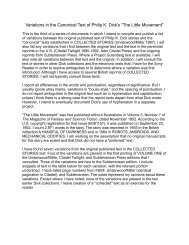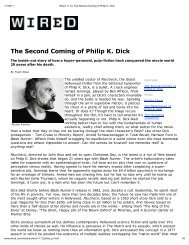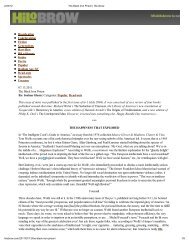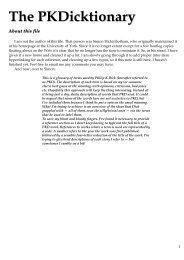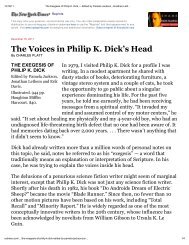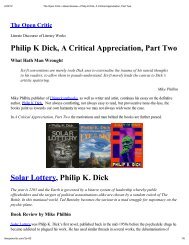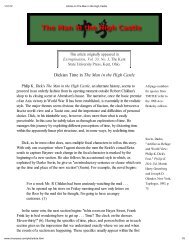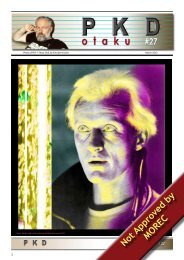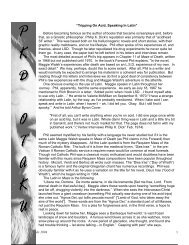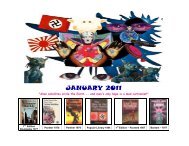Hermenaut - Philip K. Dick Fan Site
Hermenaut - Philip K. Dick Fan Site
Hermenaut - Philip K. Dick Fan Site
You also want an ePaper? Increase the reach of your titles
YUMPU automatically turns print PDFs into web optimized ePapers that Google loves.
2/25/12 <strong>Hermenaut</strong>: <strong>Philip</strong> K. <strong>Dick</strong> | HiLobrow<br />
which a humble handyman is caught up in a galactic power struggle), and “Imposter,” in which a robot thinks it’s human); and<br />
another twenty-eight the following year, including “Adjustment Team” (in which the protagonist discovers that the “ghosts” he sees<br />
are real, while he is not), and the deeply paranoid “Shell Game” (which became the novel Clans of the Alphane Moon). He<br />
continued to write short stories, off and on, for the rest of his life.<br />
This was hack writing, published with a minimum of editing; it didn’t pay well. <strong>Dick</strong> and his wife ate horse meat from the pet shop<br />
more than once during the early part of his career. It’s a (too-often made) mistake, though, to describe <strong>Dick</strong> as a “bad writer,” as<br />
though he were some naïve “outsider artist” in need of reclamation by sophisticated, tolerant readers. Vonnegut and Pynchon, for<br />
example, must be considered his disciples; and, although it’s a biographer’s duty to elevate his subject, Lawrence Sutin is not<br />
wrong to compare the black humor and intellectual daring of <strong>Dick</strong>’s parables and paradoxes to the writing of Kafka, Borges,<br />
Beckett, and Calvino. True, his prose can be uneven and even bathetic, but he learned his craft from the muscular style of the leftwing<br />
writers of the ’30s — particularly Dos Passos and Richard Wright — and the majority of his work is as passionate, complex,<br />
and hard-boiled as almost anything else published in his lifetime. Like Sartre before him (for example), <strong>Dick</strong> was a fictionalizing<br />
philosopher who combined in his writing abstract and generalized concepts with the immediacy of concrete, unique experiences:<br />
too concrete and unique, if anything, for the general public.<br />
It’s also wrong to claim, as so many of his critics have, that <strong>Dick</strong> was limited by the conventions of science fiction — which are<br />
contemptuously dismissed by <strong>Dick</strong>’s admirer, Polish sf novelist Stanislaw Lem as a “threadbare lot of telepaths, cosmic wars,<br />
parallel worlds, and time travel.” Interested, like Burroughs and Ballard, in exploding taken-for-granted notions — in his case,<br />
these include false oppositions like “true/false,” “real/illusion,” and “human/inhuman” — <strong>Dick</strong> can only have found sf’s avant-gardelike<br />
disregard for the realistic, referential constraints of New Yorker-style writing liberating. (He actually embraced the “trash”<br />
elements of the genre, insisting to Lem that “one must work with the trash, pit it against itself… If God manifested Himself to us<br />
here He would do so in the form of a spraycan advertised on TV.”) Despite his desire for mainstream recognition, <strong>Dick</strong> felt that sf<br />
was the perfect genre for his kind of writing, because its purpose is to “cut the reader loose from the actual world that he<br />
inhabits”… and, because sf fans already “have difficulty adjusting to the world,” they aren’t “hamstrung by middle-class prejudices<br />
and will listen to genuinely new ideas.”<br />
By the mid-’50s the pulp magazine boom was ending, and <strong>Dick</strong> switched to writing novels. In 1955, he wrote a mere twelve<br />
stories (including “Human Is,” about a woman who prefers her husband after he’s been possessed by an alien, and “Foster, You’re<br />
Dead,” in which the craze for bomb shelters is revealed to be a tool of social control), and sold his first novel — Solar Lottery,<br />
whose embattled hero is a humble “electronics repairman and human being with a conscience” — to Ace, a publisher of paperback<br />
originals. Spurred by slightly larger fees, <strong>Dick</strong> began to type faster and faster, pouring his pacifism (which was driven by his fear of<br />
nuclear disaster), his visceral dislike of ’50s-style paranoid politics (Kleo, a student activist, was visited by FBI agents more than<br />
once in those years; <strong>Dick</strong> claimed that he’d been instructed to spy on her), and his free-wheeling philosophical skepticism about the<br />
nature of reality into one far-fetched plot after another. In ’56 Ace published The World Jones Made and The Man Who Japed,<br />
which portrayed societies controlled by Nazi-like bureaucrats, industrialists, secret police forces, and mass media persuaders; ’57<br />
saw the publication of The Cosmic Puppets and Eye in the Sky, the latter a tragicomedy in which the chief of a missile lab<br />
struggles through a series of shared hallucinations triggered by an accident with a “Proton Beam Deflector.” Influenced by its<br />
author’s research into Hume, Jung, and the Buddhist concept of maya (world-as-illusion), Eye‘s working title was With Opened<br />
Mind; it posed a question which soon became central to <strong>Dick</strong>’s thinking: “What Is Real?”<br />
Discouraged by the fact that sf writing was dominated by “trolls and wackos” (he considered Robert Heinlein a fascist, though he<br />
borrowed money from him), <strong>Dick</strong> cranked out eight semi-surrealistic mainstream novels — about, for the most part, the unhappy<br />
domestic lives of TV salesmen — by the end of the decade, but couldn’t even get his own agent to read them. Although his wild<br />
anti-totalitarian tales were being translated for enthusiastic audiences in countries which understood such matters (Italy, West<br />
Germany, Japan, and particularly France-where, like Poe before him, <strong>Dick</strong> seemed a bohemian, dissident intellectual not taken in<br />
by the consensus illusion), in the U.S. <strong>Dick</strong> was trapped in the sf ghetto. He had great hopes, however, for the success of his novel<br />
Time Out of Joint (1959). The plot, about a creative type who realizes, when his sleepy 1958 town slowly begins to dissolve<br />
(literally) around him, that it’s actually 1994, and that a militaristic government is employing a large-scale illusion to keep him<br />
pacified, was too weird and subversive even for Ace. It was published by Lippincott as a “novel of menace,” and bombed.<br />
Uninterested in the self-congratulatory Beat scene in San Francisco, in ’58 <strong>Dick</strong> and his wife moved to the remote village of Point<br />
Reyes Station. There, he started an affair with Anne, the brilliant but unstable widow of one of the editors of Neurotica magazine.<br />
Divorcing Kleo, he married Anne and moved into her ultra-modern house, which became the setting of his great non-sf novel<br />
Confessions of A Crap Artist (w. 1959, p. 1975). Cramming his typewriter, books, hi-fi, records, comics, and pulp magazine<br />
collection into a shack down the road, <strong>Dick</strong> grew a beard, threw back enormous amounts of amphetamines, consulted the Bible<br />
and the I Ching regularly, and wrote faster than ever, producing eleven novels in 1963-’64 alone. Although he remained deeply<br />
concerned with social issues, <strong>Dick</strong> began now to turn increasingly away from specifically political concerns, and instead toward<br />
philosophical and religious questions; besides “What Is Real?” he became equally obsessed with the question “What Is Human?”<br />
hilobrow.com/2011/10/05/philip-k-dick/comment-page-1/#comment-94685<br />
2/10



